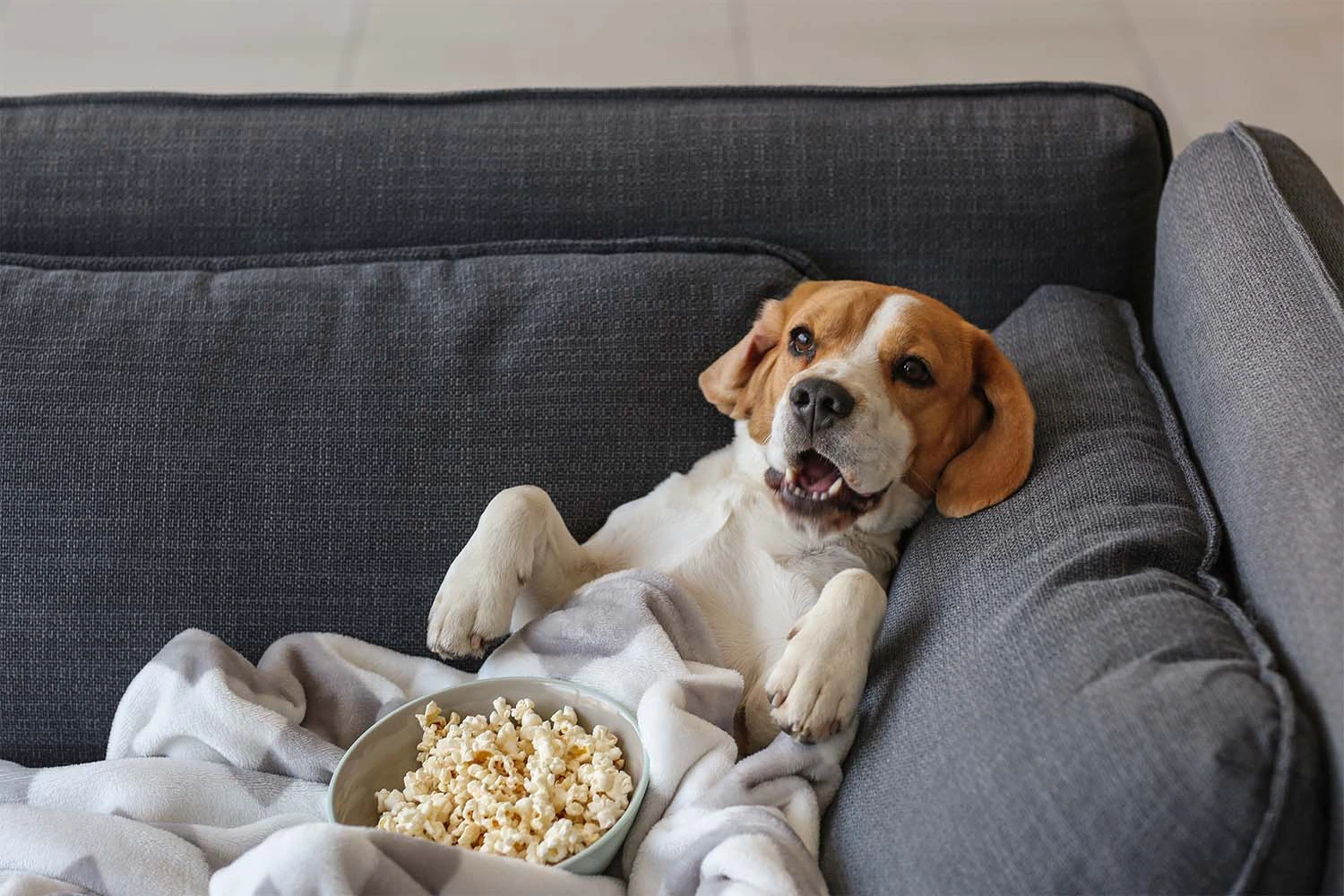Popcorn is a popular snack enjoyed by many, often associated with movie nights or casual gatherings. If you’re a dog owner, you might wonder whether this crunchy treat is safe to share with your furry friend. The good news is that dogs can eat popcorn, but there are essential precautions and guidelines to follow to ensure it’s a safe and healthy indulgence. This guide will explore the benefits, risks, and best practices for offering popcorn to your dog, while optimizing for Google search visibility.
Nutritional Benefits of Popcorn for Dogs
When prepared appropriately, plain, air-popped popcorn can provide certain nutritional advantages for dogs:
-
Low-Calorie Treat
-
Plain popcorn is low in calories, making it an excellent occasional snack for dogs managing their weight. This is particularly beneficial for overweight or less active dogs.
-
-
Dietary Fiber
-
Popcorn contains dietary fiber, which supports healthy digestion. Fiber aids in regulating bowel movements and can help prevent constipation.
-
-
Antioxidants
-
Popcorn includes small amounts of polyphenols, a type of antioxidant. These compounds can help combat free radicals, supporting overall health and immunity.
-
-
Quick Energy Source
-
As a carbohydrate-rich snack, popcorn provides an instant energy boost, making it a suitable treat for active dogs.
-
-
Mental Enrichment
-
Offering popcorn can be a fun and interactive way to provide mental stimulation during training or playtime.
-
-
Low Sodium and Fat (When Plain)
-
Plain popcorn contains minimal sodium and fat, making it healthier compared to other processed snacks when served correctly.
-
Risks of Feeding Popcorn to Dogs
While popcorn has its benefits, there are risks to be aware of:
-
Harmful Additives
-
Butter, salt, caramel, and other seasonings commonly added to popcorn can be harmful. Excessive salt can lead to dehydration or sodium ion poisoning, while butter and sugar can contribute to obesity and pancreatitis.
-
-
Choking Hazard
-
Unpopped or partially popped kernels can pose a choking risk, especially for small dogs. Always ensure the popcorn you serve is fully popped and free of hard kernels.
-
-
Digestive Issues
-
Some dogs may have sensitive stomachs and could experience bloating, gas, or diarrhea if they eat too much popcorn.
-
-
Allergic Reactions
-
Although rare, some dogs may be allergic to corn. Watch for symptoms like itching, swelling, or gastrointestinal upset.
-
-
Weight Gain (If Overfed)
-
Even plain popcorn can contribute to weight gain if given in large amounts. Keep portions small and infrequent.
-
How to Safely Serve Popcorn to Your Dog
To keep popcorn safe and enjoyable for your dog, follow these steps:
-
Choose Plain, Air-Popped Popcorn
-
Avoid microwave popcorn or varieties with added butter, salt, or seasonings. Use an air popper or stovetop method without oil.
-
-
Serve in Moderation
-
Treat popcorn as an occasional snack, not a dietary staple. A small handful is sufficient for most dogs.
-
-
Inspect for Kernels
-
Remove unpopped or partially popped kernels to prevent choking or dental issues.
-
-
Enhance Flavor Safely
-
For a special treat, sprinkle dog-safe toppings such as a pinch of cinnamon or grated cheese. Avoid any ingredients that may be harmful.
-
-
Supervise Consumption
-
Always monitor your dog while they’re eating popcorn to ensure they chew it properly.
-
-
Avoid Sweetened Varieties
-
Stay away from caramel, chocolate, or any sweetened popcorn as these can be toxic to dogs.
-
Introducing Popcorn to Your Dog’s Diet
-
Start Small
-
Introduce popcorn in small quantities to gauge your dog’s tolerance. Offer just a few pieces initially.
-
-
Monitor Reactions
-
Watch for adverse reactions such as vomiting, diarrhea, or lethargy. If these occur, discontinue feeding popcorn and consult your vet.
-
-
Use as a Training Reward
-
The crunchiness and novelty of popcorn make it an excellent training treat. Use it to reward good behavior in small, controlled portions.
-
-
Alternate with Other Snacks
-
Combine popcorn with other healthy dog treats to create variety and prevent overfeeding one type of snack.
-
Fun Facts About Popcorn and Dogs
-
Did you know that only a specific variety of corn, Zea mays everta, can pop? Its unique structure and moisture content make it perfect for creating the fluffy snack we love. Just be sure to keep it plain for your pup!
-
Popcorn has been enjoyed for over 5,000 years, with its origins traced back to ancient civilizations. Dogs, however, have only recently joined the popcorn appreciation club!
Key Takeaways
-
Plain Only: Serve only plain, air-popped popcorn.
-
Check Kernels: Ensure there are no unpopped or partially popped kernels.
-
Moderation: Treat popcorn as an occasional snack, not a meal replacement.
-
Watch for Reactions: Observe your dog’s response to popcorn.
-
Interactive Use: Incorporate popcorn into training or enrichment activities.
Conclusion
Plain, air-popped popcorn can be a safe and enjoyable treat for your dog when offered responsibly. By understanding the benefits, risks, and proper serving methods, you can include this crunchy snack as an occasional reward. Remember, moderation is key, and your dog’s overall health should always be the priority.


